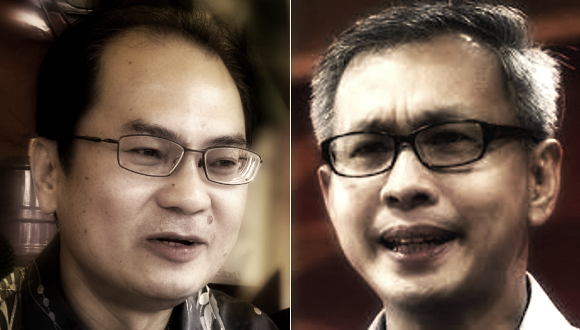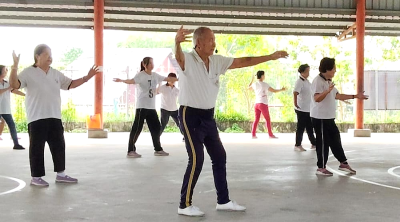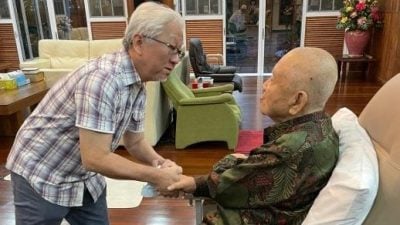By Tay Tian Yan, Sin Chew Daily
The war of words between Ronnie Liu and Tony Phua has brought to light the long-standing strife between the "Chinese chauvinists" and "English chauvinists" within DAP, marking a prelude to the party's imminent election war.
Putting aside the feud between the two gentlemen (actually nothing more than occasional grumblings and rivalry), they actually represent two contrasting mentalities and directions of political struggle.
The so-called "Chinese chauvinists" is actually a name given to them by their rivals inside the party. "Chauvinism" in political terms denotes extremism and narrow-minded ideologies.
The "Chinese chauvinists" in DAP are those who are Chinese ed and are more concerned about Chinese education and the rights of Chinese Malaysians.
Sure enough these "Chinese chauvinists" will never consider themselves as being radical or extreme. On the other hand, they see themselves as defenders of Chinese education and the rights of the Chinese people, in other words, equal rights for all Malaysians.
By comparison, the "English chauvinists" are mostly English educated. They may not even be well versed in the Chinese language and have willfully diluted their "Chinese-ness".
Often these "English chauvinists" are also referred to as "elite chauvinists", seeing themselves high on the pedestal and completely detached from the masses.
The phenomenal growth of DAP to a very large extent could be attributed to the persistent struggle of "Chinese chauvinists" typified by Chian Heng Kai and Chan Kok Kit from the 1960s through 70s. They fought so hard to defend Chinese language education in this country as well as equal rights for all Malaysians irrespective of race. They were both detained under the ISA and were elected MPs while in jail. This shows that their struggle had won the approval and support of the local Chinese people.
By contrast, the "English chauvinists" are linguistically and culturally detached from the Malaysian Chinese masses. That said, these people will eventually helm the party's power structure and set the future direction of the party, among them Lim Kit Siang and Lim Guan Eng, who later took in the likes of Tony Phua, Liew Chin Tong and Hannah Yeoh.
When Pakatan Harapan took over the federal government in 2018, "English chauvinists" were rewarded with ministerial and deputy ministerial positions, although the "Chinese chauvinists" were the ones doing most of the work to bring DAP to what it is today.
After DAP became a component of the ruling coalition, the party's direction changed distinctly, as it attempted to dilute its Chinese-ness to win the trust of the Malay society.
When Lim Guan Eng was the finance minister, he insisted that he was representing Malaysians and not just Chinese. This was then followed by the Jawi controversy, Malay Dignity Congress and so forth which the "English chauvinists" endorsed. Even after the PH government collapsed, these "English chauvinists" still kept defending Tun Mahathir.

DAP's public image took a dive in under two years' time. Many grassroots and supporters felt completely disenchanted.
The "Chinese chauvinists" believe this has been an outcome of the party's decision to distance itself from the local Chinese community in a bid to please the mainstream Malay society, abandoning the party's early principle of political struggle while betraying the Malaysian Chinese community.
In the meantime, the "English chauvinists" insist the party must embrace a multiethnic approach as part of its transformation program.
The eruption of conflicts between these two rival factions within DAP apparently has something to do with the upcoming party elections.
Going further, this is a result of the internal conflicts already brewing inside the party.
For the past so many decades, DAP has thrived on the support of Chinese Malaysians. The seats that it has won are almost predominantly Chinese, and the party has managed to win the hearts of Chinese voters invariably through the exploitation of issues related to them — things from Chinese language education to their economic rights that strike a chord with the Chinese people.
Unfortunately given the political reality of the country, Chinese votes alone will no longer satiate the party's appetite for expanded scope of influence. While the party's Chinese-ness has helped grow the party, it has also triggered suspicion and resistance from the Malay voters, thus limiting the party's further development.
DAP's effort to please the Malay voters has not really worked. The Malay society is still very much put off by DAP's aggressive political manipulations.
Meanwhile, the party's effort to dilute its Chinese-ness has made many a Chinese Malaysian feel that they have been betrayed by the party. They used to pin their hopes on DAP to fight for them to reverse the many unfair and unjust government polices, but having placed them in power for only two years, all they have is a much bigger sense of frustration.
The confrontation between the Chinese and English chauvinists is a tug-of-war between rival factions in the party, and a dilemma it has to overcome.
ADVERTISEMENT
ADVERTISEMENT


































